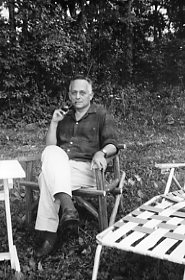Love is believing, when editors don’t
One day I will write the greatest love story of all time, because it will be about the love affair between Byrne and Duncan Miller. It will not be a sappy romance, or always happy. But as everyone who ever witnessed the magnetic field between them will attest, it will be riveting.
Just a tease then, of that someday story, drawn from what might seem to be a trivial detail. When I was in my twenties, Byrne told me that an established New York editor once compared Duncan’s writing to that of Thomas Mann. I had never read the Nobel-prize-winning German writer so it seemed a bit of unnecessary name dropping at the time. I had no need of external validation – I never doubted Byrne’s biography of the husband she adored. He had been a copywriter in Manhattan’s golden age of advertising, grown tired of copy writing and dedicated the rest of his life to novels.
Byrne and Duncan’s first “date” was a meeting of a writer’s group in Manhattan that Byrne joined to improve her technique. Duncan walked her home and over the course of the fifty city blocks, convinced her to quit the group because real writers don’t need groups. He also convinced her to marry him.
Their sixty-year romance was well chronicled in the journal Byrne kept for her two daughters, now housed in the Special Collections of the Beaufort County Library. “Duncan and I agreed that we each should have a chance at a career,” Byrne wrote. “He would have first try – writing at home while I earned the money.”
The next part, to me, is the very definition of love. “I edited his day’s writing and re-typed it. In ’34, Duncan submitted his “Sit in Dark Palaces” to the Atlantic Monthly. It did not win the prize, but one of the ten big editors said he’s the only one this side of the Atlantic Ocean writing like Thomas Mann.”
By the time Duncan died, Byrne had edited and re-typed six complete novels by Duncan, all of which ended up in bankers boxes under the home-made sofa in their living room – unpublished. There were also hundreds of rejection letters – the early Thomas Mann glimmer of hope was the only one of its kind.
I’ve always wondered how she did it, how she kept encouraging Duncan through six decades of disappointment, how that single reference to Thomas Mann managed to keep them going. So this year I read several stories and novellas by Thomas Mann, searching for similarities to Duncan Miller.
“A writer is somebody for whom writing is more difficult than it is for other people.”– Thomas Mann
What I found is that that anonymous editor didn’t lie. In his attempt to let Duncan down gently, he may have encouraged a lifetime of futility but there are similarities. They both wrote in many modes: Mann from everyday realistic to surreal, Duncan from political to paranoid. Both were heavily influenced by Nietzsche, Mann so much that he rarely abandoned the theme of the artist as outsider, “a dubious figure, a creature of sickness and longing for death.”Duncan shared with Byrne what would become her favorite quote. “Life is hard to bear, but do not affect to be so delicate.” – Nietzsche.
A major theme in Mann’s work is homoeroticism. The scholar Jefferson S. Chase describes “Death in Venice” as based on a true-life, same-sex crush Mann developed while on a vacation with his brother and wife. He never established a clear moral position in regard to homosexuality. Neither did Duncan. Byrne wrote that the first of his six novels, “Sit in Dark Places” was the story of a boy with a sexual love for his mother. His final novel, “Regiment of Woman” was about a soldier who had a sex change to prove that women feel more than men. In a handwritten note Byrne asked, rhetorically I presume, “What does all this add up to?”
The answer wasn’t the one she wanted. Byrne said her one regret in life, was never getting Duncan published. I think it telling that she didn’t describe this regret as never seeing Duncan published. But I suspect Thomas Mann would understand.
“A man’s dying is more the survivors’ affair than his own.” – Thomas Mann


April 20, 2011 at 1:59 PM
Of course the comparison to Mann must have been an impetus to continue writing; but surely to maintain the writing for decade after decade and rejection after rejection required something else. Myabe Mann’s aphorism would be more apt as “A writer is someone for whom writing is more necessary than it is for others”.
LikeLike
April 20, 2011 at 2:32 PM
I’ll make it my new motto. Thanks for this!
LikeLike
April 21, 2011 at 10:58 AM
It is clear to me after reading Teresa’s beatifulful piece that Love sees all possibilities. Byrne saw the author Duncan could be. Love is so exquisite, rare and boundless that when it happens – you know all things are possible.
LikeLike
April 21, 2011 at 2:52 PM
When Duncan looked me in the eyes it was like taking a trip to a dark and mysterious place. He was also quite spontaneous. Maybe writing was the same. I remember Byrne saying that Duncan was brilliant in his first draft but not interested in editing. He found it quite tedious. Maybe writing for him what dance was like for Byrne a momentary expression of deep inner feelings. Like love.
LikeLike
April 26, 2011 at 8:14 AM
“Life is short. Art is long.” Somebody said that; most of us at least sometimes are drawn to the longer duration, and some stay with it.
LikeLike